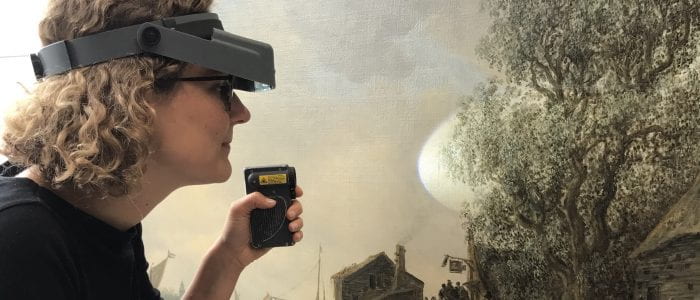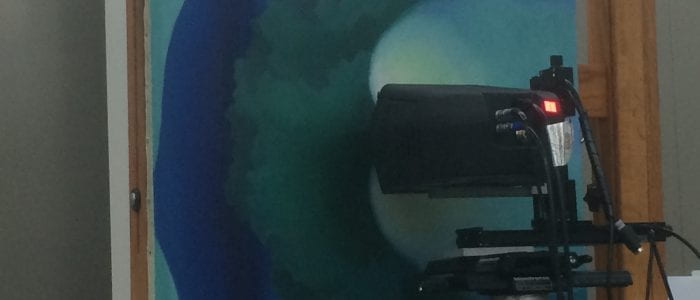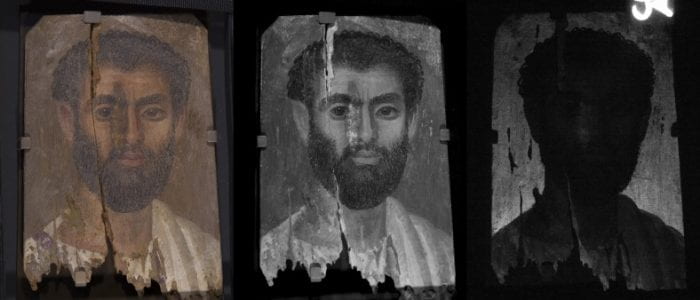CuBISM is a multi-year interdisciplinary research and educational/training program at the intersection of science and art, focusing on art as a catalyst for the development of innovative and holistic approaches to change over time in complex materials systems. Through computationally based imaging of structure in the materials used to create works of art, the central challenge is to tie the visual appearance of painted surfaces to the underlying molecular and microscopic material structures, and to use this correlation to investigate material properties. The analytical and methodological tools developed by the project will have broad relevance to the materials science and conservation science communities, illustrating the creative aspects of both science and art to a diverse audience.
Funded by the National Science Foundation’s Partnerships for International Research and Education (PIRE) program, the project leverages expertise and resources from Northwestern University, the Art Institute of Chicago, and leading cultural heritage institutes in the Netherlands, France, and Italy. Through this collaborative research and educational infrastructure, the project prepares early career scientists to engage in globally integrated research networks, building skills in communicating the role of science in society.
Project Aims
The CuBISM vision derives from the shift in the national discourse around interdisciplinary education from STEM to STEAM—science, technology, engineering, ART, and math—in acknowledgment that arts-based skills are essential components of innovation, collaboration, and the communication of complex ideas.
Rather than compartmentalizing different aspects of materials behavior, CuBISM aims to develop holistic approaches to problem solving that push beyond the limitations of current methodologies and analysis procedures. Historic art objects, as heterogeneous collections of materials aged over decades or centuries, provide a series of well-defined and inspirational case studies for investigating complex materials systems in a much more integrated manner than is commonly attempted. Choosing examples from art provides broad educational impact in academia and beyond, encouraging diverse participation in scientific inquiry.
The program is structured around two main research aims:
- Materials Modeling: Develop combined experimental and computational approaches to understand the mechanisms contributing to property degradation and to image property changes in materials. Learn More
- Computational Imaging: Establish correlations between material properties at molecular and microscopic scales and the visual appearance at the macroscopic scale. Learn More
Each aim is broken down into specific research topics pursued by Northwestern University PhD students in conjunction with their mentors from Northwestern and partnering institutions.
To develop innovative, experiential learning experiences bridging science and art and to facilitate access to instrumentation by a diverse group of users, Northwestern University and the Art Institute of Chicago partner with:
The Netherlands Institute for Conservation, Art and Science (NICAS), a new multidisciplinary research institute, centered in Amsterdam uniting the disciplines of science, conservation, and art history in a cohesive and robust research program
The European ancient materials platform (IPANEMA) at Synchrotron SOLEIL, one of the French-funded Laboratories for Excellence aimed at advancing an overall national policy for high-level research and training
The CNR (National Research Council), the lead player in the Integrated Platform for the European Research Infrastructure on Cultural Heritage (IPERION CH) that integrates facilities throughout Europe in the area of Heritage Science. Learn More
Funding
CuBISM is supported by the National Science Foundation (NSF) Partnerships for International Research and Education (PIRE) program under Grant Number 1743748.
Principal Investigator: Kenneth Shull
Co-Principal Investigators: Francesca Casadio and Aggelos Katsaggelos (former co-PIs: Marc Walton, Oliver Cossairt)
Sponsor: Northwestern University



